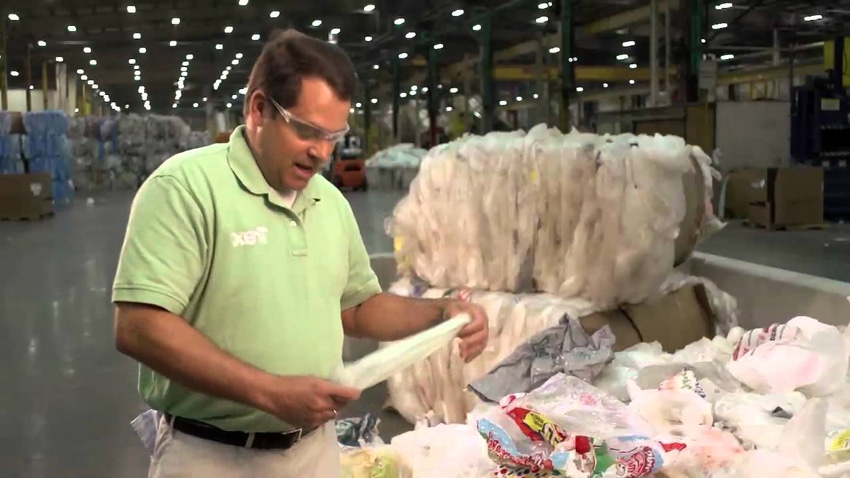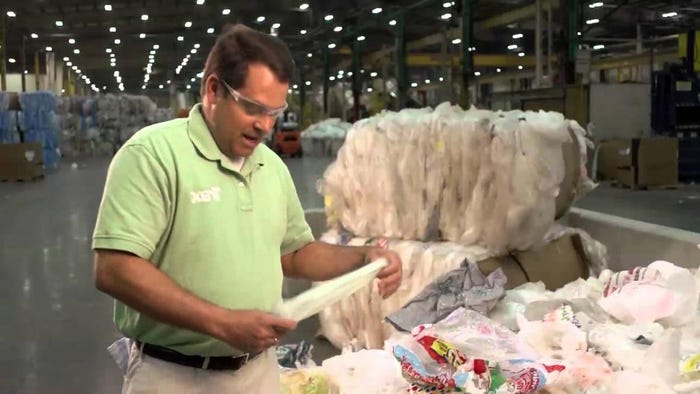Trex Co. (Winchester, VA), the world’s leading manufacturer of high-performance, wood-alternative decking and railing, has found a sustainable approach to close the recycling loop by using its leftover raw material to create linear low density polyethylene (LLDPE) pellets. Ideal for use in a wide range of manufacturing applications, these pellets represent an entirely new business venture for the company.
September 10, 2015

Trex Co. (Winchester, VA), the world’s leading manufacturer of high-performance, wood-alternative decking and railing, has found a sustainable approach to close the recycling loop by using its leftover raw material to create linear low density polyethylene (LLDPE) pellets. Ideal for use in a wide range of manufacturing applications, these pellets represent an entirely new business venture for the company.
 “As they say, necessity is the mother of invention,†explained Jim Cline, President and CEO of Trex. “As one of the country’s largest recyclers of post-consumer and commercial polyethylene, we found ourselves with a surplus of material beyond what we could use in our core line of outdoor living products. We challenged our engineering team to come up with ways to use the excess material and, as usual, they didn’t disappoint. In fact, what they developed has created a whole new business venture for us that not only benefits Trex, but other manufacturers and the environment, as well.â€
“As they say, necessity is the mother of invention,†explained Jim Cline, President and CEO of Trex. “As one of the country’s largest recyclers of post-consumer and commercial polyethylene, we found ourselves with a surplus of material beyond what we could use in our core line of outdoor living products. We challenged our engineering team to come up with ways to use the excess material and, as usual, they didn’t disappoint. In fact, what they developed has created a whole new business venture for us that not only benefits Trex, but other manufacturers and the environment, as well.â€
Utilizing its best-in-class recycling and extrusion capabilities—and spending equipment downtime to experiment with and test different solutions—the Trex engineering team was able to deliver a LLDPE plastic pellet suitable for use in a variety of products and industries.
“We envision numerous applications for our recycled pellets,†explained Dave Heglas, Senior Director of material resources at Trex. “They are ideal for use in the production of bags, including trash bags, as well as molded products such as bins, totes and even kayaks. We also see tremendous potential for these pellets in the manufacturing of both rigid and flexible tubing, such as agricultural drip tape.â€
Heglas, a chemical engineer with a background in rocket science and missile design, joined Trex in 1996 as an engineer responsible for the raw materials and plastic processing side of the business. After a few years working with recycled materials, he recognized the potential value in using and repurposing recycled plastic. In 2004, Heglas started up the company’s recycling operations.
“Turning Trex from a company using recycled plastic into a plastic recycler was something that made perfect strategic sense,†explained Heglas. “We were collecting way more than we needed or could ever use in our deck boards, so we began selling off some of our inventory to manufacturers in other industries.â€
Among those manufacturers were small companies that Trex contracted to produce plastic pellets. Eventually, it dawned on Heglas that Trex could be fabricating pellets in-house rather than outsourcing to third parties. After nearly a decade of experience producing pellets for Trex internal use, the next logical step was to tap into the in-house expertise and expand capabilities to produce pellets for additional industries and markets.
“We quickly realized that we were the only company capable of producing LLDPE pellets in high volumes and with greater consistency,†said Heglas. “Previously, manufacturers had to rely on multiple sources for plastic pellets which meant unpredictable quantities and widely-varying product characteristics. With our extensive supply and equipment capacity, Trex is able to deliver the quantities and quality manufacturers’ need at a lower price and with the added convenience of a single-source provider.â€
Currently, Trex has four lines dedicated to recycled pellet production, making it one of the largest producers of recycled LLDPE pellets in the nation. The company is planning to add several more lines down the road.
What makes Trex’s LLDPE pellets so appealing is that, like all Trex products, they are made from recycled materials. Designed to partially displace virgin and off-spec resin, they allow manufacturers to lower their material costs and promote a more eco-friendly option to customers.
“Trex was literally built on sustainable principles and these continue to be at the heart of everything we do,†added Heglas. “With this new business, we are looking to partner with manufacturers that recognize the many benefits of using recycled materials and share our commitment to protecting the environment.â€
Trex is currently working with manufacturers across a wide range of industries—such as rotational molding, blown film, profile extrusion and material compounding— to find additional uses for its LLDPE pellets. As the product innovator, the company has the flexibility to modify and re-formulate pellet content as needed to better fit specific needs, processes and applications.
.
About the Author(s)
You May Also Like


